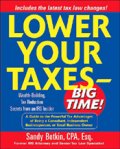Tax Audits: What Signs Make You More Likely to be Audited by the IRS?
by SixWise.com
It's a major fear for most Americans: A notice from the Internal Revenue
Service (IRS) summoning you for an audit.
|
 What
is it about these three letters that strikes a cord of fear in Americans'
hearts? Learning the signs that could put your tax return at the
top of the list for an audit, and avoiding them if possible, may
put your mind at ease. What
is it about these three letters that strikes a cord of fear in Americans'
hearts? Learning the signs that could put your tax return at the
top of the list for an audit, and avoiding them if possible, may
put your mind at ease.
|
Statistically speaking, your chances of actually being audited aren't
that high-according to IRS data, one in 150 individual taxpayers were
audited in 2003. This number had gone down in recent years-about one of
every 79 tax returns was audited in 1998-but then, in 2004, individual
taxpayer audits exceeded 1 million for the first time since 1999.
Also in 2004, the IRS gathered a record $43.1 billion in enforcement
revenue, a 15 percent increase from 2003. Now in 2005, the IRS plans to
add more enforcement to their team, meaning that more tax audits could
potentially be performed.
What adds to most people's fear of being audited is that of the unknown:
Very few people know just how the IRS chooses which tax returns to audit.
"That's a very closely guarded secret that not many people in the
IRS know," said Bernard S. Kent, a partner with the human resource
services group at PriceWaterhouseCoopers.
Still, there are some signs that will put your tax return at the top
of the "to audit" pile. So take notice of -- and by all means
avoid if they're not legitimate -- these red flags that increase your
chances of catching the tax examiner's eye.
|
Stop Overpaying the Government!
 Most
Americans pay the government hundreds to thousands of dollars too
much every year. This overpayment could be avoided if they knew
the legitimate and legal secrets in the highly recommended book,
Lower
Your Taxes - Big Time: Wealth-Building, Tax-Reduction Secrets from
an IRS Insider. Most
Americans pay the government hundreds to thousands of dollars too
much every year. This overpayment could be avoided if they knew
the legitimate and legal secrets in the highly recommended book,
Lower
Your Taxes - Big Time: Wealth-Building, Tax-Reduction Secrets from
an IRS Insider.
This book is easily one of the smartest under-twenty-dollar investments
anyone could possibly make. Some of the many tax-saving, money-making,
audit-avoiding secrets the book exposes right away include:
-
How to Deduct Nearly Every Meal You Eat Out
-
How to (Easily) Turn Your Vacations into Tax Deductible Write
Offs
-
How to Deduct All of the Equipment in Your Home for Business-Even
If You Never Claim a Home Office Deduction!
-
How to Entertain Yourself & Others and Get Major Tax Savings
for It!
-
Eliminate Up to 40% of Your Social Security and Medicaid Tax
-
The 8 Ways to Dramatically Reduce the Chances of Ever Getting
Audited
-
How to Get Deductions for Feeding and Entertaining Your Spouse!
-
Why Hosting Parties Can be One of the Smartest Investments
You Make
-
How to Double-Deduct All of the Equipment You Use in Your
Business and Protect it All from Legal Judgments Forever
- Why the RIGHT Home Office Deduction is a Gold-Mine that Alone
Can Earn you $14,000 Every Five Years
|
A computer program called the Discriminant Index Function, or DIF, is
the first way your tax return could be marked for an audit. It looks most
closely at the following items:
-
Higher incomes: If your income is more
than $100,000, your chances of being audited increase to one in 20.
Says Eric Tyson, co-author of "Taxes 2005 for Dummies,"
"Higher income earners are more likely to be audited because
there is more tax money at stake."
-
High incomes compared to the previous year
-
Unreported income (investment returns, etc.)
-
Income other than basic wages (contract payments, etc.)
-
Home-based business: Particular attention
is given to returns that claim home businesses in addition
to a salary income or excessively high deductions that don't match
with the business (for instance, expensive business meals for a virtual
administrative assistant.) You should also be careful with how you
define your home office. "The room has to be used exclusively
for business purposes," said Kent. "You cannot just have
a desk in your living room where you have a television set."
-
Large business meal and entertainment deductions or excessive
business auto use
-
Low income with large business deductions: Did you report
earning $40,000 and write off a $50,000 car for business? Chances
are a tax examiner will find your return warrants a closer look.
-
Non-Cash Charitable Deductions
-
Hobby Losses: Filing a Schedule C to report income or loss
from a sole proprietorship that is not really a business but a hobby
is one of the highest risk moves you can make.
-
Offshore credit cards
-
Large casualty losses: The rules for claiming a casualty loss
are very specific, so be sure your loss qualifies before claiming
it.
- Having several dependents.
Tax returns that claim the earned income tax credit-a
break for those with low-incomes-are also scrutinized more closely by
the IRS. That's because its requirements are complex and many honest
mistakes are made by those who think they qualify, along with those who
intentionally try to increase the credit's payout.
If You Have Legit Deductions, Take Them
|

Don't let a visit from the taxman intimidate you into paying too
much. Educating yourself about legit deductions and credits is your
best line of defense-and the best way to save your hard-earned cash.
|
This isn't to say that you should be afraid to make honest deductions
on your tax return or shy away from credits for which you qualify in order
to avoid the IRS. According to Robert G. Nath, author of "The
Unofficial Guide to Dealing with the IRS," As long as your deductions
and expenses are legitimate and you have documentation, they will be allowed."
In fact, most Americans overpay on their taxes, which is why we highly
recommend reading Lower
Your Taxes - Big Time: Wealth-Building, Tax-Reduction Secrets from an
IRS Insider as soon as possible in 2005 (or you will likely end up
paying the government hundreds or even thousands of dollars in taxes that
should have been yours to keep.)
Written by a former IRS tax attorney and senior tax law specialist, Sandy
Botkin, CPA, Esq., Lower Your Taxes - Big Time is one of the smartest
under-twenty-dollar investments anyone could possibly make.
And in the event that you get the dreaded IRS letter in the mail that
your tax return is being audited-don't despair. "Just because you
get a correspondence audit letter, there's no need to panic," says
Nath. "In fact, if you get a letter instead of a call, that indicates
the IRS views the inquiry as not particularly earth shattering."
For more money-saving tips in 2005, don't miss these past SixWise.com
articles:
Sources
Are
You Audit Bait?
5 Audit
Red Flags
Avoid
Being Red Flagged by the IRS